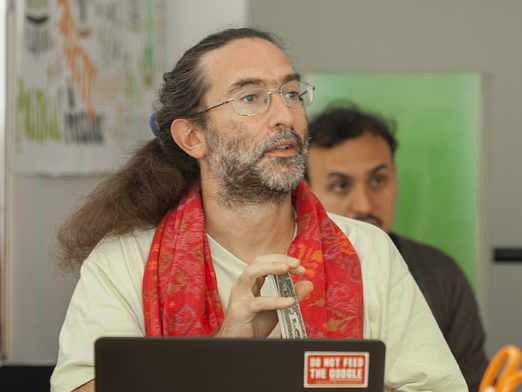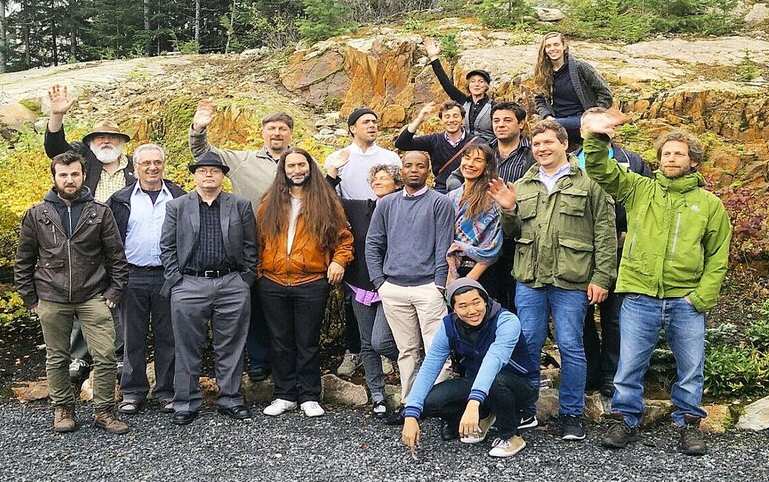While many projects enter and exit the community currency field, the major players move very slowly - since I started meddling in 2004, only a few mild achievements seem worth mentioning.
- the actors know each other better, in part because we are using the internet better and in part because of a biannual academic conference, and I think those actors have collectively learned a fair bit, though almost nothing of that learning crossed the gulf into the Bitcoin discourse.
- The major blocs within timebanking and LETS have been mostly reinforced by software; CES emerged as the only global player, but it is by no means dominant, Community Forge emerged in Europe but largely didn't spread beyond Francophones, and small software projects are still manifold.
- CES has become a network of multiple currencies, spread accross multiple web servers, and using multiple technologies, and for me, is leading the way, yet it receives little attention and investment, and to this day has only one engineer.
- I don't feel the movement has grown much while I've been in it, but there's still no data available about that. Even the big networks publish no more than a google map; there's no discussion about what constitutes a countable system, and there's still a tendency to show the largest possible numbers (which are the numbers that require the least processing).
- Our discourse is still outside even the most radical politics, ignored by classical monetary reformers, hardly understood by progressives. It is neither practised as a strategy for change, not used in the most vibrant economies.
- Bitcoin stirred a lot of new interest in money, but brought with it a crude Austrian economics; much of the enthusiasm was fueled by unexpected windfalls, and much of the fervour turned out to be about making a quick buck without creating anything of value. Much of the innovation has been sold to venture capitalists.
- I regard projects like Ripple/Stellar as missed opportunities because they are based on a proper understanding of credit as money, but all their attention is elsewhere, partly because their power is universally overlooked and partly because they need to justify themselves financially.
- Even as it becomes cheaper and more powerful, technology continues to be a race in which we lag. As I wrote in 2010, the systems we have are mostly old, depending on few and unpaid engineers, and have poor usability.
Greater cooperation between individuals and networks is key. Projects are too focused on their own specific objects rather than continually enquiring where and with whom they can have the most impact. In this talk I explain how my project was in service of so many other projects, and how I had collaborated with several people in the room.
Seen from a systems perspective, money is more like an operating system, than a program, and as such it sits under, provides services to, and connects all other programs! So in monetary networks above all, we must not allow our activism to be circumscribed by specific organisations or networks.
Small, isolated monetary systems are valuing their sovereignty above all other things, including their effectiveness. They struggle to meet operating costs, to produce decent education materials, to develop and host and update and support software, even before any transactions are taking place. And every group, even the larger ones are struggling as I described in my last post.
I can think of only two software projects apart from my own which have attempted to serve the movement without launching currencies of their own, Freecoin and OpenMoney, though neither has any major implementations.
From 2008 I have been arguing and coding for Drupal as a unifying technology for social movements; but things haven't worked out that way. Now not only has the architecture of the Internet changed, but writing software 24/7 is no longer how I want to help!
So I think a lot of the stasis we are facing is because we trying to support such a great diversity of software, all of which is doing mostly the same thing.
From now I'm changing my call. I invite all social movements, and especially complementary currencies to organise around building a modern software ecosystem, NOT a platform which can be owned, but a set of APIs and open source implementations which can be used off the shelf or easily tailored.
This is nothing to do with replacing Facebook, but to support modern life in flesh & blood communities! In this ecosystem payment systems would be just one tool sitting alongside a plethora of other potential services such as marketplaces, event calendar, neighbour alerts, and voting. By better coordinating we can make all of these interoperable, meaning that the services are aware of each other, and the groups are aware of each other without building a monolithic system vulnerable to domination by Big Capital.
I'm aware of projects like Synereo and Fermat, which are focused on building the next internet and learning from past mistakes, but waiting so far hasn't yielded a silver bullet. These other projects often turn out to be too ambitious, or are led in different directions, like Cyclos whose donors eventually walked away and they were forced to serve more conventional institutions. The best way for change-makers and activists to acquire the software they want is to build it and own it themselves.
So here is the actual news: I'm now in talks with Community Forge, CES, Timebanking New South Wales, Mutual Aid Network and others about a new level of cooperation. If you know a community that wants to address these problems in partnership with others, or of a community network that struggles with software, please get in touch.


Comments4
thank you for writing! I just
thank you for writing! I just visited Community Forge site today to review it. I worked with th Mutual Aid Networks and am pursuing our process as a pilot site steward. We have been working on such comprehensive systems, but they alos contain learning curves. I feel good about this moment for introducing strong ideas to wider groups, such as alternate currncies beyond the novelty level. There is momentum around divesting from banks engaged in fossil fuel extraction. I would love to also encourage people to be reinvesting their funds into local networks that can get to work and create lasting common value in their areas. Please keep in touch, i am ready to asssit in testing programs as a user and steward. Thank you
Matthew, thank you, I think
Matthew, thank you, I think this is a tremendously important next step. Our conclusion also is that programming languages and applications will be forever in a state of change, and that we need to let them be so. So, if we can have standards implemented in APIs so that anyone can plug in and become interoperable with others, that is a powerful path forward to economic ecosystems.
It's a very good plan to seek
It's a very good plan to seek to bring developers and support people into some kind of coalition for the development of CC software and apps. And you are just the person to do this given your extensive networks in the field and following your own attempts to 'rationlize' the situation before now.
I think it would justify a Patreon type of funding bid (I'd add some cash) and my request would be to get going on the apps side of things first. Glad that Tim of CES is involved - a fitting morph of his generous, previous works.
In the past what I have found frustrating is that entry into the process of writing apps (or helping develop them in some way) is obscure for newbies so, whilst you go about this project, how about also taking on some apprentices to increase the size of the team by training up a few people?
Cheers
Member for
17 years 10 monthsThanks Andrew, There is an
Thanks Andrew,
There is an app in process, coincidentally. The idea is to make an API between the platform and the mobile device, make a mobile app, and then start disintermediating our platforms with new web services.